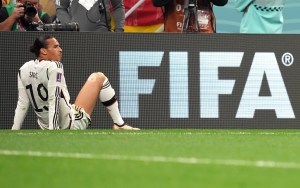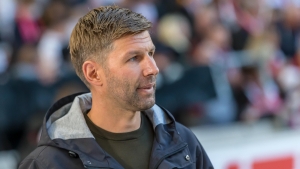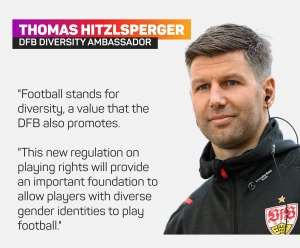German players are unlikely to make any major political statements at Euro 2024 after their World Cup protest in Qatar was met with a tepid domestic reception, ex-international Thomas Hitzlsperger has predicted.
Seven European nations at the 2022 global showpiece – including England – initially planned to wear ‘OneLove’ anti-discrimination armbands but were dissuaded following the threat of sporting sanctions from FIFA.
Instead, the Germans covered their mouths for a World Cup team photograph in protest, while the tournament remained overshadowed by the host nation’s record on human rights, from its treatment of migrant workers to the criminalisation of same-sex relationships.
Hitzlsperger, who bookended his playing career with spells at Aston Villa and Everton and a decade ago became the first former Premier League player to come out as gay, said: “It ended for the German team not in a good way. Funnily enough, back home a lot of people criticised it whereas abroad it was seen as a big statement.
“After the tournament, some of the representatives of the German national team just said, ‘look, at the Euros we talk about football, nothing else’. So I don’t expect much from the team similar to the World Cup.
“I think the England team were the first ones to play, and they decided against the One Love armband. A lot of the German players, they felt a responsibility, they felt ‘we’ve got to make a statement’.
“They couldn’t rely on the other teams. I think there were seven teams in the end that tried to stick together and wear the armband, and then they all collapsed, basically. And that’s when the Germans were like, ‘We still have to do something’.”
The former midfielder, who is now serving as an ambassador for this summer’s tournament in his home country, agrees that Germany’s poor showing likely influenced negative sentiment around the protest.
He said: “Football can be brutal. If you win, you set the tone and whatever you do it’s accepted and people look up to you. If you don’t win, you lose football matches, then you better not say anything.”
Even before the tournament, said the 42-year-old, the German public was already divided over whether or not the national team – or anyone – had a responsibility to act.
“It was a very difficult debate and it never came to a conclusion,” said Hitzlsperger.
“Some said it’s too much politics, others said it was right what we did, and that’s where we ended. That was our opportunity to say ‘we’re hosting a European Championship, let’s have a really good time together’, talk about responsibility when it comes to sustainability but don’t teach the world what to do.”
Organisers hope the tournament itself will instead do the talking, with ambitions to become be the most sustainable European Championship of all time through the use of entirely pre-existing stadia run by 100 per cent renewable energy sources, a zoned match schedule reducing travel distances for teams and fans, and the creation of a climate fund dedicated to projects focused on mitigating tournament-related unavoidable emissions.
It is also the second major football tournament, following in the footsteps of last summer’s Women’s World Cup, to sign a human rights declaration.
UEFA has stated EURO 2024 “embraces gender identities and expressions as a spectrum that is not limited to a binary concept”, with gender-neutral toilets available at all venues and similarly neutral lanes outside the stadia to accommodate a range of gender expressions for procedures like body checks.
Ultimately, says Hitzlsperger, “the German FA, UEFA, the German government and the foreign ministry, (will do) everything we can do, without putting the team under too much pressure to say ‘every game you have to make a statement’.
“You have to know who is responsible for what, and unfortunately what happened in Qatar really made the players aware of the consequences if you take a stance on human rights.”






























